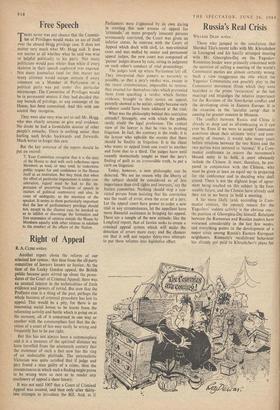Right of Appeal
R. A. CLINE writes:
Another report about the reform of our criminal lavi system : this time from the all-party committee of lawyers known as Justice. At the time of the Lucky Gordon appeal, the British public became quite stirred up about the proce- dures of the Court of Criminal Appeal; there was an unusual interest in the technicalities of fresh evidence and powers of retrial. But now that the Profumo case is a thing of the past, perhaps the whole business of criminal procedure has lost its appeal. This would be a pity, for there is an interesting social lesson to be learnt from the reforming activity and bustle which is going on at the moment, all of it concerned in one way or another with the commonplace fact that the de- cision of a court of law may easily be wrong and frequently has to be put right.
But this has not always been a commonplace and it is a measure of the spiritual distance we have travelled from the nineteenth century that the statement of such a fact now has the ring of an undeniable platitude. The paternalistic Victorian was quite satisfied that if judge and jury found a man guilty of a crime, then the circumstances in which such a finding might prove to be wrong were so rare as to render any machinery of appeal a sheer luxury.
It was not until 1907 that a Court of Criminal Appeal was created, and then only after thirty- two attempts to introduce the Bill. And, as if Parliament were frightened by its own daring in creating this new avenue of appeal for 'criminals,' or more properly innocent persons erroneously convicted, the Court was given an inferior status. In contrast with the Court of Appeal which dealt with civil, i.e. non-criminal cases and was staffed by senior and permanent appeal judges, the new court was composed of `puisne' judges drawn by rota, sitting in judgment on each other's conduct of trial proceedings.
The judges took up where Parliament left off. They interpreted their powers as narrowly as possible, so that a jury's verdict was, except in the rarest circumstances, impossible to reverse; they enacted for themselves rules which prevented them from quashing a verdict which further evidence, brought to their notice on appeal, patently showed to, be unfair, simply because such evidence could have been adduced at the trial.
What was the philosophy behind this restrictive attitude? Strangely, one with which the public rarely credit the legal profession. The cynical view of the lawyer is that he tries to prolong litigation. In fact, the contrary is the truth; it is the lawyer who upholds the maxim that there should be finality in litigation. It is the client who wants to appeal from one court to another and from that to a third. The judges have until recently instinctively sought to treat the jury's finding of guilt as an irreversible truth, to put a curb on litigation.
Today, however, a new philosophy can be detected. `We see no reason why the liberty of the subject should be considered as of less importance than civil rights and interests,' say the Justice committee. Nothing should stop a con- victed person from insisting that his conviction was the result of error, even the error of a jury. Let the appeal court have power to order a new trial in any circumstances, let the appellant have more financial assistance in bringing his appeal. These are a sample of the new attitude; like the Longford report, that of Justice seeks to create a criminal appeal system which will make the detection of errors more easy; and the chances are that it will, not require thirty-two attempts to put these reforms into legislative effect.


































 Previous page
Previous page